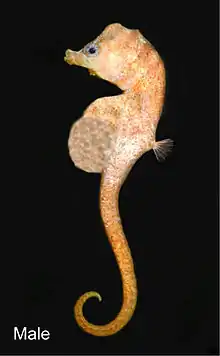| Bullneck seahorse | |
|---|---|
 | |
| Scientific classification | |
| Domain: | Eukaryota |
| Kingdom: | Animalia |
| Phylum: | Chordata |
| Class: | Actinopterygii |
| Order: | Syngnathiformes |
| Family: | Syngnathidae |
| Genus: | Hippocampus |
| Species: | H. minotaur |
| Binomial name | |
| Hippocampus minotaur M. F. Gomon, 1997 | |
The bullneck seahorse (Hippocampus Minotaur) is a pygmy seahorse in the genus Hippocampus. This seahorse has never been found in the wild,[1] and little is known about its natural habitat. The only known specimens were collected on the coast of Eden, Australia. It is thought to live in sand beds at the bottom of the ocean, "64 - 100 meters below sea level" possibly wrapping its prehensile tail around gorgonian corals. The seahorse is among the 25 “most wanted lost” species that are the focus of Re:wild's “Search for Lost Species” initiative.[3]
Martin F. Gomon produced the first description of Hippocampus minotaur in Memoirs of Museum Victoria in 1997.[4] It is still unknown if it will ever be found again without proper investigation or equipment because of the depth it resides at.
Visually it is similar to other pygmy seahorse species but with a wide neck, snubbed face, and a small body with a small pectoral fin, hence the scientific name having "Minotaur" because of its large head to body ratio. It has a possibly yellow orange coloration that is used to blend in to the natural coral sea beds off the deep coasts of Australia. But even at that it is still questioned on its nature.
References
- 1 2 Pollom, R. (2017). "Hippocampus minotaur". IUCN Red List of Threatened Species. 2017: e.T10077A54906067. doi:10.2305/IUCN.UK.2017-3.RLTS.T10077A54906067.en. Retrieved 16 November 2021.
- ↑ "Appendices | CITES". cites.org. Retrieved 2022-01-14.
- ↑ "The Search for Lost Species". Global Wildlife Conservation.
- ↑ Gomon, Martin F. (1997). "A remarkable new pygmy seahorse (Syngnathidae: Hippocampus) from southeastern Australia, with a redescription of H. bargibanti Whitley from New Caledonia". Memoirs of the Museum of Victoria. 56: 245–253. doi:10.24199/j.mmv.1997.56.10. Retrieved 2019-05-21.
